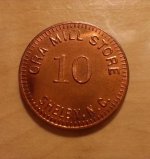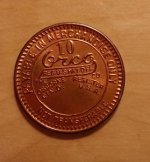KennyFLA
Jr. Member
- Mar 5, 2013
- 24
- 11
- Primary Interest:
- All Treasure Hunting
I bought this token at the flea market for $5 because I thought it was pretty cool. I am pretty sure it is uncirculated as I can feel all of the edges from the letters and it has a brand new luster and no scratches or scuffs. The man selling them had several others but I felt like this was the best looking one. I recalled learning about similar tokens at school. From what I remember, during the depression people who would work for a company were paid with these tokens which were only redeemable for goods at the company store. Anyone know anything about the value of one of these tokens? I couldn't really find much about this particular one online.


Thanks for looking.


Thanks for looking.






